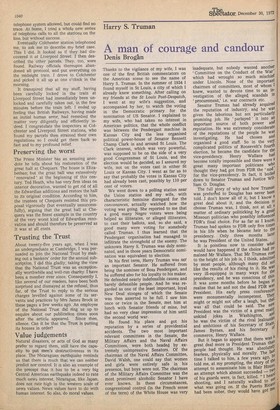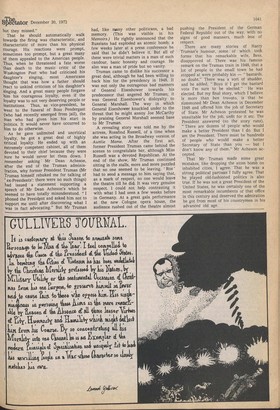Harry S. Truman
A man of courage and candour
Denis Broghn
Thanks to the vigilance of my wife, I was one of the first British commentators on the American scene to see the name of Harry S. Truman. In the summer of 1934 I found myself in St Louis, a city of which I already knew something. After calling on my friends at the St Louis Post-Despatch, I went at my wife's suggestion, and accompanied by her, to watch the voting in the Democratic primary for the nomination of US Senator. I explained to my wife, who had taken no interest in American politics, that the whole conflict was between the Pendergast machine in Kansas City and the less organised political power-house of Senator Bennett Champ Clark in and around St Louis. The Clark interest, which was very powerful, was supposed to be on the side of a very good Congressman of St Louis, and the election would be decided, so I assured my wife, not on the votes cast in either St Louis or Kansas City. I went as far as to say that probably the votes in Kansas City had already been cast, possibly by 110 per cent of voters.
We went down to a polling station near the Union station and my wife, with characteristic feminine disregard for the convenances, actually watched how the voting was going. She reported to me that a good many Negro voters were being helped as illiterates, or alleged illiterates, to cast their ballots, and, so she said, a good many were voting for somebody called Truman. I thus learned that the Pendergast organisation had managed to infiltrate the stronghold of the enemy. The unknown Harry S. Truman was duly nominated, and in those years Democratic nomination was equivalent to election.
In his first term, Harry Truman was not an important Senator. He suffered from being the nominee of Boss Pendergast, and he suffered also for his loyalty to his maker. He defended nearly indefensible causes and barely defensible people. And he was re garded as one of the least important, loyal New Deal stooges of which the Senate was then asserted to be full. I saw him once or twice in the Senate, met him at lunch with Senator friends of mine, but had no very clear impression of him until the second world war.
He found his place and got his reputation by a series of providential accidents. The two most important relevant committees in the Senate, the Military Affairs and the Naval Affairs Committees, were both headed by ex tremely unimpressive Senators. Of the chairman of the Naval Affairs Committee, David Walsh, one could say that women and girls were entirely safe in his presence, but boys were not. The chairman of the Military Affairs Committee was the most prominent alcoholic Senator I have ever known. In these circumstances, congressional control (in the French sense of the term) of the White House was very inadequate, but nobody wanted another Committee on the Conduct of the War1 which had wrought so much mischief under Lincoln. None of the important chairmen of committees, most of whom I knew, wanted to devote time to an irr vestigation of the alleged scandals in procurement,' i.e. war contracts etc. Senator Truman had already acquired the reputation of industry, and he waS given the laborious but not particularly promising job. He ' parlayed ' it into an important source of both power and reputation. He was extremely considerate of the reputations of the people he was investigating. He had chosen and organised a good staff. So in the verY complicated politics of Roosevelt's fourth election, he became the candidate for the vice-presidency. Henry Wallace had become totally impossible and there were 8 great many important politicans wh thought they had got from FDR the '00d for the vice-presidency. In fact, it boiled down to Senator Truman and Justice ham 0. Douglas. The full story of why and how Truman was preferred to Douglas has never been told. ,I don't know all of it, but I know 0 great deal about it, and the decision te choose Truman was, I think, not at all 8 matter of ordinary politicking by a great Missouri politician who possibly influenced FDR's final choice. For as far as I knoW, Truman had spoken to FDR only five tirneS in his life when he became heir to the presidency. Only three months later he was President of the United States. It is pointless now to consider what would have happened if the choice had re' mained Mr Wallace. That Mr Truman rose to the height of his job is, I think, admitted by most people, although many did not like the results of his rising to it. He 05 very ill-equipped in many ways for th e presidency, and he was conscious of this. It was some months before he began te realise that he and not the dead FDR 05 President. His early press conferences were monumentally incompetent. The): might or might not offer a laugh, but OP was all that could be said. The neW President was the victim of a great marl unkind jokes in Washington, ail he was the victim of the rival jealousie' and ambitions of his Secretary of State; James Byrnes, and his Secretary (/' commerce, Henry Wallace. But it began to appear that there Was I/ great deal more in President Truman that' people had thought. He was absolutel fearless, physically and morally. The feS, time I talked to him, a few years ago, h! told me, at my prompting, the story of the attempt to assassinate him in Blair Houset; an attempt which almost succeeded — tVIA of his guards were, in fact, killed. " I hear; shooting, and I naturally walked to se: what was going on. If the Puerto Rica! had been sober, they would have got 111'
but they missed."
That he should automatically walk towards the firing was characteristic, and Characteristic of more than his physical courage. His reactions were prompt, sometimes too prompt, but a great many of them appealed to the American people. Thus, when he threatened a fate worse than death to the music critic of the Washington Post who had criticised his daughter's singing, most Americans thought that was how a father should react to unkind criticism of his daughter's singing. And a great many people forgave him his courageous loyalty, even if the loyalty was to not very deserving people or institutions. Thus, as vice-president, he Went to the funeral of Boss Pendergast (who had recently emerged from jail), the man who had given him his start in politics. It would never have occurred to him to do otherwise.
As he gave unlimited and uncritical loyalty, he got a great deal of highly critical loyalty. He ended up with an extremely competent cabinet, all of them devotec. to their chief because they were sure he would never let them down. I remember asking Mr Dean Acheson, after the end of the Truman administration, why former President Truman (Mr Truman himself rebuked me for talking of 'ex-Presidents': there were no such things) had issued a statement supporting a speech of Mr Dean Acheson's which he seemed to have totally misunderstood. "I phoned the President and asked him not to support me until after discovering what I Was in fact advocating." But Mr Truman
had, like many other politicans, a bad memory. (This was visible in his Memoirs.) He rightly announced that the Russians had exploded an atomic bomb; a few weeks later at a press conference he said that he didn't believe it. But all of these were trivial matters in a man of such candour, basic honesty and courage. He also was a man of pride but no vanity.
Truman came to dislike his successor a great deal, although he had, been willing to back him for the presidency in 1948. It was not only the outrageous bad manners of General Eisenhower towards his predecessor that angered Mr Truman; it was General Eisenhower's disloyalty to General Marshall. The way in which General Eisenhower knuckled under to the threat that he might annoy Joe McCarthy by praising General Marshall seemed base to Mr Truman.
A revealing story was told me by the actress, Rosalind Russell, of a time when she was acting in the Broadway version of Auntie Mame. After the first act, former President Truman came behind the scenes to congratulate her, although Miss Russell was a devoted Republican. At the end of the show, Mr Truman continued sitting in the stalls, more and more puzzled that no one seemed to be leaving. ' Ros ' had to send a message to him saying that, as a mark of respect, no one would leave the theatre till he did. It was very genuine respect. I could not help contrasting it with what I had seen a few weeks before in Germany. At a great gala performance at the new Cologne opera house, the audience rushed out of the theatre almost
pushing the President of the German Federal Republic out of the way, with no signs of good manners, much less of respect.
There are many stories of Harry Truman's humour, some of which took forms that his remarkable wife, Bess, disapproved of. There was his famous remark on the Truman train in 1948, that a lot of people in the small town he had stopped at were probably kin — " bastards, no doubt." There was a sort of shudder, and he added, " Boys if I get the bastard vote I'm sure to be elected." He was elected. But my final story, which I believe is more than ben trovato, is that he summoned Mr Dean Acheson in December 1948 and offered him the job of Secretary of State. Mr Acheson protested he was unsuitable for the job, unfit for it etc. The President answered (so the story runs), "There are dozens of people who would make a better President than I do. But I am the President. There must be hundreds of people who would make a better Secretary of State than you — but I don't know any of them." Mr Acheson accepted.
That Mr Truman made some great mistakes, like dropping the atom bomb on inhabited cities, 1 agree. That he was a strong political partisan I fully agree. That he played old-fashioned politics is also true. If he was not a great President of the United States, he was certainly one of the most remarkable incumbents of that office in this century and deserved the admiration he got from most of his countrymen in his advanced old age.



































 Previous page
Previous page